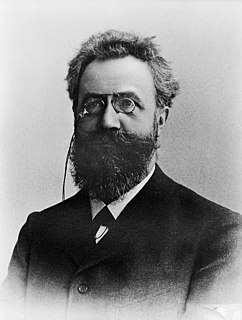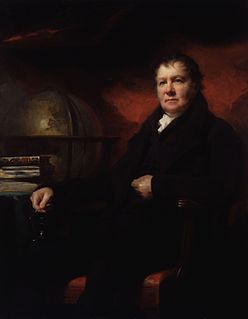A Quote by William Whewell
The earlier truths are not expelled but absorbed, not contradicted but extended; and the history of each science, which may thus appear like a succession of revolutions, is, in reality, a series of developements.
Related Quotes
I define science fiction as the art of the possible. Fantasy is the art of the impossible. Science fiction, again, is the history of ideas, and they're always ideas that work themselves out and become real and happen in the world. And fantasy comes along and says, 'We're going to break all the laws of physics.' ... Most people don't realize it, but the series of films which have made more money than any other series of films in the history of the universe is the James Bond series. They're all science fiction, too - romantic, adventurous, frivolous, fantastic science fiction!
This example illustrates the differences in the effects which may be produced by research in pure or applied science. A research on the lines of applied science would doubtless have led to improvement and development of the older methods - the research in pure science has given us an entirely new and much more powerful method. In fact, research in applied science leads to reforms, research in pure science leads to revolutions, and revolutions, whether political or industrial, are exceedingly profitable things if you are on the winning side.
This [the opening of the Vatican City radio station built by Marconi earlier in 1931] was a new demonstration of the harmony between science and religion that each fresh conquest of science ever more luminously confirms, so that one may say that those who speak of the incompatibility of science and religion either make science say that which it never said or make religion say that which it never taught.
So says the most ancient book of the Earth; thus it is written on its leaves of marble, lime, sand, slate, and clay: ... that our Earth has fashioned itself, from its chaos of substances and powers, through the animating warmth of the creative spirit, to a peculiar and original whole, by a series of preparatory revolutions, till at last the crown of its creation, the exquisite and tender creature man, was enabled to appear.
To write the true natural history of the world, we should need to be able to follow it from within. It would thus appear no longer as an interlocking succession of structural types replacing one another, but as an ascension of inner sap spreading out in a forest of consolidated instincts. Right at its base, the living world is constituted by conscious clothes in flesh and bone.
It is impossible to read the history of the petty republics of Greece and Italy without feeling sensations of horror and disgust at the distractions with which they were continually agitated, and at the rapid succession of revolutions by which they were kept in a state of perpetual vibration between the extremes of tyranny and anarchy . . . great improvement . . . were either not known at all, or imperfectly known to the ancients.
God works in mysterious ways. Things may look good outwardly, but there may be evil contained inside. Let no one be deluded by pride that he himself has conceived good ideas or done good deeds. If everything were as it seemed, the Prophet would not have cried out with such illuminated and illuminating perspicacity, Show me things as they are! You make things appear beautiful when in reality they are ugly; You make things appear ugly when in reality they are beautiful. Show us therefore each thing as it is lest we fall into a snare and be ever errant.
The science of politics is the one science that is deposited by the streams of history, like the grains of gold in the sand of a river; and the knowledge of the past, the record of truths revealed by experience, is eminently practical, as an instrument of action and a power that goes to making the future.








































